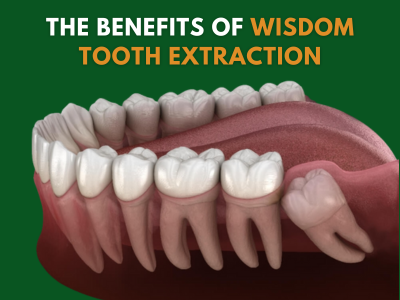The Benefits of Wisdom Tooth Extraction
Have you ever wondered about those last set of molars that appear in your late teens or early twenties? They’re called wisdom teeth, and while they sound wise, they often cause more problems than they solve. At Maple Dental, we understand the concerns you might have about these late arrivals. Many people face issues with their wisdom teeth, leading to pain, discomfort, and other dental complications. That’s why we’re here to talk about the significant benefits of wisdom tooth extraction and why it might be the right choice for your oral health.
What are wisdom teeth?

Wisdom teeth are the third set of molars at the back of your mouth. These typically emerge in your late teens or early twenties, which is why they are often referred to as “third molars.” For some, these teeth can come in without any issues, but for many, wisdom teeth can cause a variety of problems. When these teeth don’t have enough space to grow properly, they can become impacted, or they can lead to other complications such as infection or overcrowding. This is where extraction becomes a valuable solution.
Why is wisdom tooth extraction important?
There are several reasons why having your wisdom teeth removed can significantly improve your dental health. As a trusted dentist in Hesperia, CA, we’ve seen firsthand how this procedure can help with a variety of common dental problems. Let’s take a closer look at the top benefits of wisdom tooth extraction.
1. Prevention of infection
One of the most common reasons for wisdom tooth extraction is to prevent or treat infection. When wisdom teeth don’t have enough space to emerge properly, they can become partially impacted, leaving an opening where bacteria can enter. This can result in infections, swelling, and severe discomfort. In some cases, infection can spread to nearby teeth or gums, leading to more serious oral health issues. Removing the wisdom teeth early can prevent these infections from ever occurring, saving you from unnecessary pain and complications.
2. Avoiding crowding and misalignment
Another significant benefit of removing wisdom teeth is the prevention of overcrowding. As these third molars push their way through, they can shift the other teeth in your mouth, potentially causing alignment problems. This can result in crooked teeth, which may require braces or other orthodontic treatments to correct. By removing the wisdom teeth before they have a chance to cause this damage, you can maintain the alignment of your smile. If you’re interested in maintaining a beautiful, straight smile, it’s worth considering the extraction of your wisdom teeth early.
3. Reducing risk of cysts or tumors
In some cases, wisdom teeth can become encased in fluid-filled sacs, known as cysts. These cysts can lead to the formation of tumors and damage the surrounding bone or teeth. If left untreated, this can cause permanent damage to your jaw and facial structure. By choosing to remove your wisdom teeth when they are young and before complications arise, you can help prevent the formation of cysts and avoid more serious issues down the line.
4. Better oral hygiene
It’s hard to clean the back of your mouth, especially when wisdom teeth start to emerge. These teeth are often difficult to reach with regular brushing and flossing, and food particles can get trapped in the hard-to-reach spaces, leading to plaque buildup. This plaque can eventually lead to cavities and gum disease. Removing wisdom teeth makes it much easier to maintain good oral hygiene, which contributes to overall oral health. It also decreases the likelihood of plaque buildup and the development of cavities in areas that are hard to reach with a toothbrush.
5. Minimizing future complications
While wisdom tooth removal may seem like an inconvenience, addressing the problem before it gets worse can save you from more invasive and expensive treatments in the future. For instance, if your wisdom teeth cause an abscess or other complications later on, you may require more extensive treatments like root canals or bone grafts. By opting for early extraction, you avoid these potential problems and the costs associated with them.
6. A smooth recovery process
While the thought of surgery can be intimidating, it’s worth noting that the recovery process for wisdom tooth extraction is usually quick and manageable. Our experienced team at Maple Dental provides clear post-procedure instructions, and most patients are back to their normal routine within a few days. Swelling and discomfort are typically minimal, and with proper care, the recovery period is relatively short.
7. Preventing damage to nearby teeth
In some cases, impacted wisdom teeth can push against neighboring teeth, causing damage. This can result in tooth decay, gum disease, or even the misalignment of the adjacent teeth. By removing the wisdom teeth before they have the chance to cause this damage, you can protect the health of your nearby teeth and avoid more complex dental issues.
Is wisdom tooth extraction right for you?
While not everyone needs to have their wisdom teeth removed, there are many situations where extraction is highly recommended. If you’re experiencing pain, swelling, or discomfort from your wisdom teeth, or if your dentist has recommended extraction, it’s a good idea to schedule a consultation with us at Maple Dental.
Smile brighter with expert care – book your appointment today!
At Maple Dental, we’re not just about teeth — we’re about people. Whether you need wisdom tooth removal or a routine checkup, we offer quality dental care with a personal touch. Our experienced team is here to give you and your family the care you deserve, in a warm and welcoming environment.
We’re proud to be your go-to dentist in Hesperia for a pain-free smile. Don’t let wisdom tooth pain interfere with your daily life. Book an appointment with us today or call 760-949-7274 to speak with our friendly staff.
Your smile matters – visit Maple Dental today!
Let us help you boost your confidence with a beautiful smile and live pain-free.


